
“Responsible tourism”, “Sustainable travel” and “Ecotourism” are buzzwords that are a bit difficult to define. To some, it may conjure images of and luxury resorts that come with an eye-watering price tag. And to others, sustainable travel might bring to mind volunteer programs in remote villages where electricity is scarce and WiFi is non-existent.
But being a responsible tourist encompasses so much more than that.
I can assure you that responsible travel is not just a niche activity. It’s not only for the wealthy, and it’s not just for gap year students with time to kill.
Traveling responsibly is possible for anyone who has the ability to travel.
We’re going to share practical tips you can incorporate on your next trip to be a more responsible traveler.
But first, let me explain why you should care…
Why is responsible travel important?

Travel is becoming more accessible to the masses, with more people than ever taking an international trip each year.
How many people are we talking? 1.8 billion people. Let that number sink in for a minute: 1.8 billion.
During my trip around the world with the United Nations World Tourism Organization (UNWTO), I was lucky enough to attend the Closing Ceremony celebrating 2017 as the “Year of Sustainable Travel”.
Taleb Rifai took the stage and gave his last speech as Secretary General of the UNWTO, and in his speech he said this:
“1.8 billion travelers can be 1.8 billion opportunities or it can be 1.8 billion disasters.”
It may seem a little dramatic, but he’s right.
Tourism can bring economic growth and better jobs. It can mean cultural exchange and the preservation of history. It can bring increased awareness of global issues and an understanding of people different than ourselves.
But it can also mean pollution. It can mean the violation of human rights. Tourism can degrade and diminish cultures, and it can put communities in a cycle of dependency.
Are you part of the 1.8 billion travelers each year?
If so, YOU have a big responsibility.
Which category do you want to fall into: An opportunity or a disaster?
I think most people want to travel in a way that brings more good into the world but don’t know where to start.
Are you nodding your head?
Well, good, because in this article I am going to give you practical and actionable ways that YOU can travel more responsibly and be a part of the opportunity.
What kind of traveler are you?
- A) Maybe you travel to broaden your worldview and doing so in a responsible way is a huge priority to you. Perhaps you even choose destinations based on what your impact will be.
- B) Or maybe for you traveling is your time to unplug and you really don’t want to think about each decision you’re making. Maybe all this talk about “responsible travel” is making you feel guilty and you’re rolling your eyes as you read this.
Maybe you’re a little bit of both. (Yep, that’s me!)
I can assure you whichever type of traveler you are, there are simple ways you can bring positive change to the place you’re visiting.
Article Contents
This article is broken up into things you can do before, during and after your trip. Jump to the section you’re most interested in, or keep reading to see all our tips for becoming a responsible tourist.
- Tips for BEFORE Your Trip
- Tips for DURING Your Trip
- Tips for AFTER Your Trip
BEFORE Your Trip
Before boarding your plane, there are some things you can do to prepare for a responsible vacation that benefits more than just you.
1. Pack with sustainability in mind
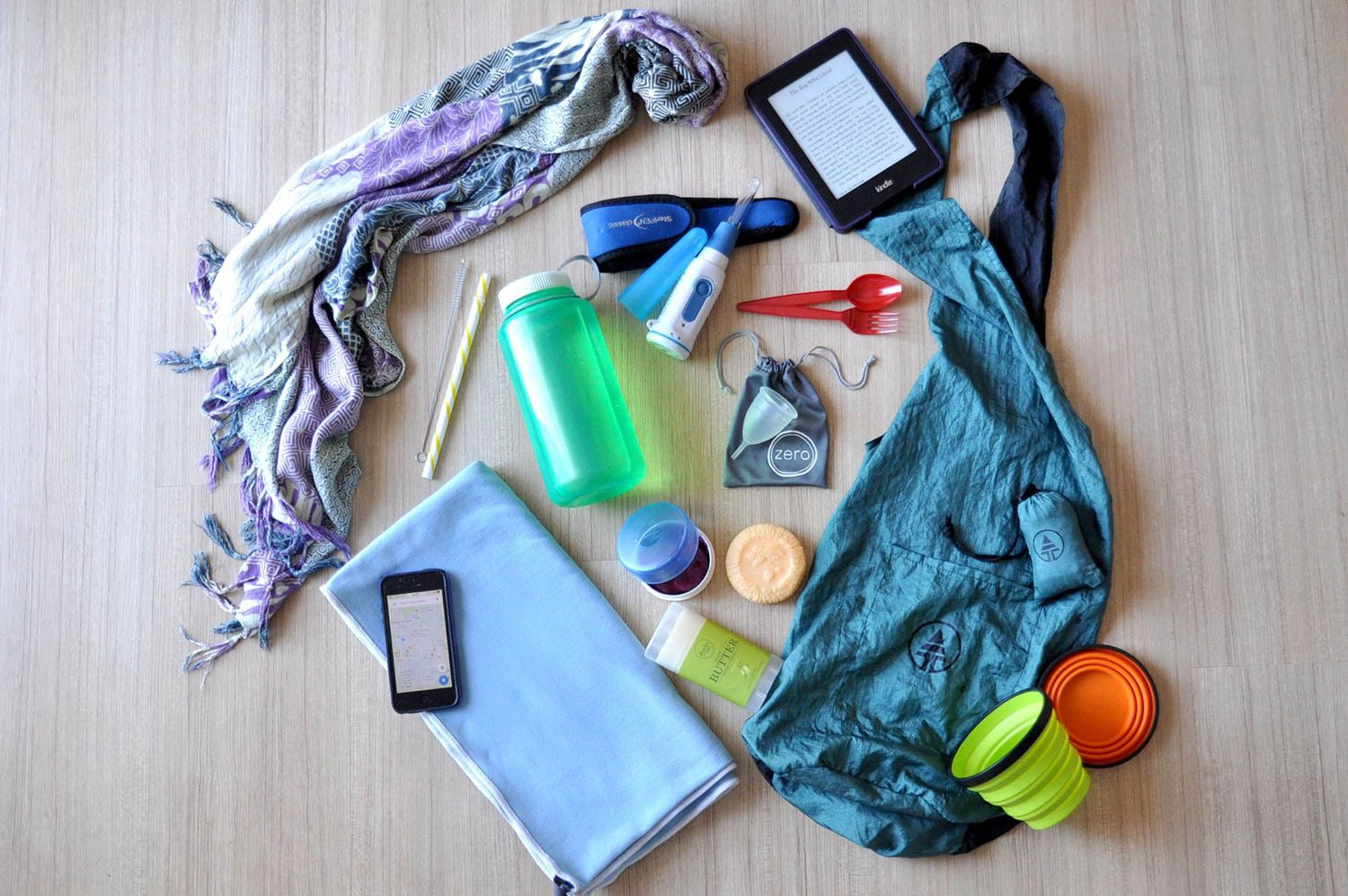
It’s so much easier to make good decisions when you’re prepared.
How many times have you ended up in the grocery check out and realized that you forgot your reusable bags so you have to resort to plastic? Just like keeping reusable bags in your car helps you remember them on your shopping trips, packing the right items can help you reduce waste on your travels.
And in addition to packing reusables, be sure to politely decline plastic bags, straws, to-go containers and bottles of water. This article has 4 phrases for plastic-free travel translated into several languages to help you prevent plastic waste along your travels!
Read more: Check out our eco-friendly travel gear packing list for some ideas to help you pack better!
2. Choose companies wisely
When you’re planning a trip, it can be downright overwhelming with all the choices you have to make. But sometimes the more specific you are with what you’re looking for, the easier it is.
- In addition to looking for tour companies with high reviews, look for those that are giving back a portion of their profits to their community.
- When choosing a hotel, pick one with a prime location that is also environmentally conscious.
- Try dining at a restaurant that ranks highly in TripAdvisor and also hires staff members with special needs.
- Book activities with a company that is known for Eco, Sustainable & Green Travel Tours like Stride Travel.
3. Mind your manners

Part of sustainable travel is creating good relationships between visitors and locals. This certainly won’t happen if you visit another country and offend its residents.
Nobody travels with the intention of being rude. (Well, maybe some do, but I’d like to think that most have good intentions.) But with even the best intentions, you can easily offend someone if you don’t know what is considered rude in the country you’re visiting.
A quick Google search of “manners in ______” can give you insight into what is appropriate in the place you are visiting.
You may find out that exposed shoulders are unacceptable, and you can pack clothing accordingly. Or you will read that certain hand gestures that are acceptable in your country are offensive in the place you’re traveling. But without doing the research ahead of time, you’ll never know that you’re being disrespectful to local customs.
4. Think about the country you’re visiting
Traveling sustainably in Germany is going to look quite different than in Colombia. (See what I mean here!) Each country has different needs, values and resources.
Research the current issues in the country you’re planning to visit and ask yourself this question:
“When I travel to _____, what can I do to bring positive change?”
- Will you aim to take public transportation as much as possible and vow to recycle?
- Will you try your best to support small, family-run businesses?
- Will you learn about the history and culture and connect with locals to create relationships?
- If you’re planning to visit developing countries, reflect on how you can deal with experiencing poverty on your travels.
Understanding how you can bring positive change during your travels can help shape your trip and ensure that you are traveling sustainably.
5. Choose your hotels wisely
Did you know that hotels have the largest carbon footprint in tourism industry? It takes an incredible amount of water and energy to run a hotel, and with that comes a lot of waste.
Try choosing hotels that are committed to lessening their impact.

Some things to look for in an eco-friendly hotel:
- Instead of small toiletry containers guests can take away, they have refillable bottles to reduce the amount of plastic waste (Pictured above: Excuse the goofy picture!)
- Electricity is powered by room key so you can’t leave the room with lights and air-conditioning on
- On-site recycling bins (many hotels surprisingly do not!)
- They encourage guests to reuse towels and sheets between washings
Tip: In some places it may be difficult to find eco-friendly hotels, but supporting small local establishments instead of international chains can be one way to feel good about your hotel choice.
6. Think twice before animal encounters
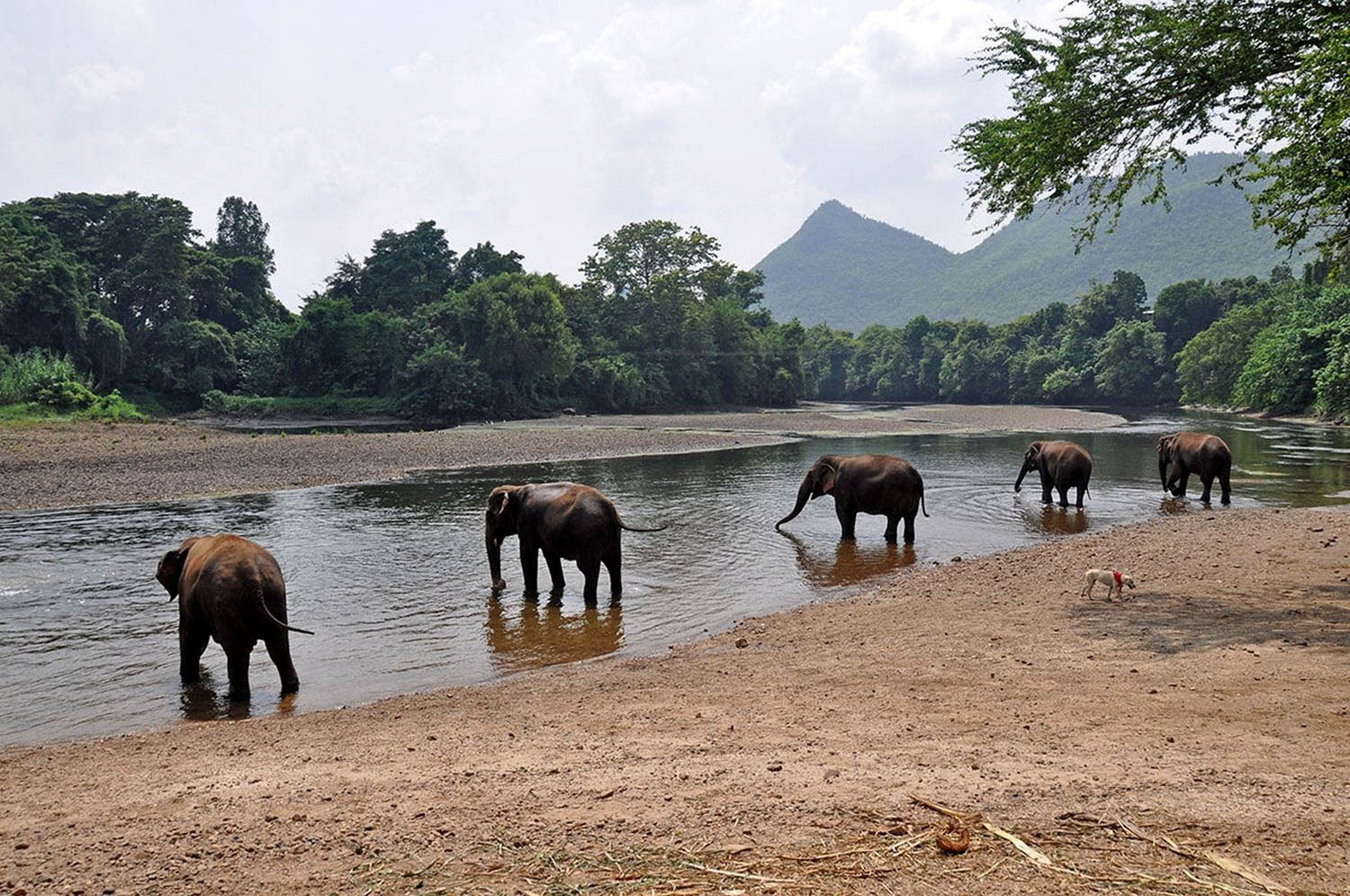
This isn’t to say that all animal tourism is bad; but frankly, a lot of it is. Before booking a snorkel trip with whale sharks, do some research on the issue. Before landing on an elephant “sanctuary”, read reviews from past visitors and ensure that it is in fact a good place to visit.
Companies are realizing that tourists are becoming more aware of animal welfare issues and some will unfortunately call themselves a “sanctuary” while still maintaining bad practices. This means that you’ll have to put a little more work in ahead of time if you want to see animals on your vacation, but your efforts will be worth it.
DURING Your Trip
There are so many things – big and small – you can do during your trip to be a more responsible traveler.
7. Travel Slow
When possible, slow travel can make a huge difference in your impact on the places you visit.
Think about it this way: When you travel at a quick pace, you’re often taking more than you give. Slowing down allows you to make more conscious decisions.
Here are just a handful of ways slow travel is different than galavanting at a traditional pace:
- take buses, trains and ferries instead of highly-polluting flights
- you can patronize many businesses in a particular place
- you’ll learn about the place you’re visiting — its culture and history — and you might even form local friendships
- you can take part in rewarding experiences like doing beach clean-ups and homestays that you woudn’’t have time for if you travel quickly
Slow travel is not only a good way to make a positive impact, but it often leads to deeper, more authentic experiences.
Sound like your style? Read more about slow travel and get tips for your next trip!
We’re huge proponents of slow travel, but it’s also worth noting that not everyone can take loads of time off. Travel in itself is a privilege, and traveling slowly is (in our opinions!) an even greater freedom. If you have the flexibility and want to travel more consciously, slow travel is one of the best places to start.
8. Avoid chains

When you choose local restaurants, shops, hotels and tour companies, your money will go back into the community you’re visiting.
While it can be fun trying the top-rated restaurant on TripAdvisor, it is just as fun walking into a local, family-run restaurant where Mom cooks Grandma’s recipes and the grandchildren are your servers. Booking a locally-run guesthouse will make a bigger impact on the community than staying at a Hilton.
Instead of going with big international chains, try your best to support the locals where your money will go further.
9. Be flexible
If you plan every moment of your itinerary, you won’t have the freedom to support small businesses you find along the way or to interact with locals.
If you feel better planning most things ahead of time, then by all means do it. But try to leave some empty slots of time you can fill by talking to locals, walking into small shops and eating at a restaurant that isn’t listed on TripAdvisor. You won’t regret it.
10. Ask tough questions
If a business claims to be “green” or sustainably run, they should expect (and welcome!) questions about their practices.
- If a tour company claims to pay its staff fair wages, ask your guide how they like working for the operator.
- If a hotel claims to be “eco-friendly”, ask about energy consumption.
- If a restaurant boasts locally-sourced produce, ask where it’s grown.
Unfortunately, it’s all too easy to slap the words “eco” or “green” in front of a business name, and customers will blindly believe that the company is doing all the right things. Hold companies to high standards and ask them about how their business is run. And it if they are not practicing what they preach, take action (see #13).
11. Read up on how you can travel more responsibly
There are so many little things you can do each day on your travels that will create less waste, support locals and create a more meaningful experience.
We created an e-book that lays out some practical ways you can travel more responsibly. It’s free, so go ahead and grab it now!
Become a Responsible Traveler
Interested in responsible travel? (Yay, we thought so!) Enter your email below and we’ll send you our FREE e-book with our 33 Best Responsible Travel Tips! We’ll also send you bonus travel tips on how to travel smarter, cheaper and better.Send me the e-Book!
We won’t send you spam. Unsubscribe at any time.
12. Think about transportation
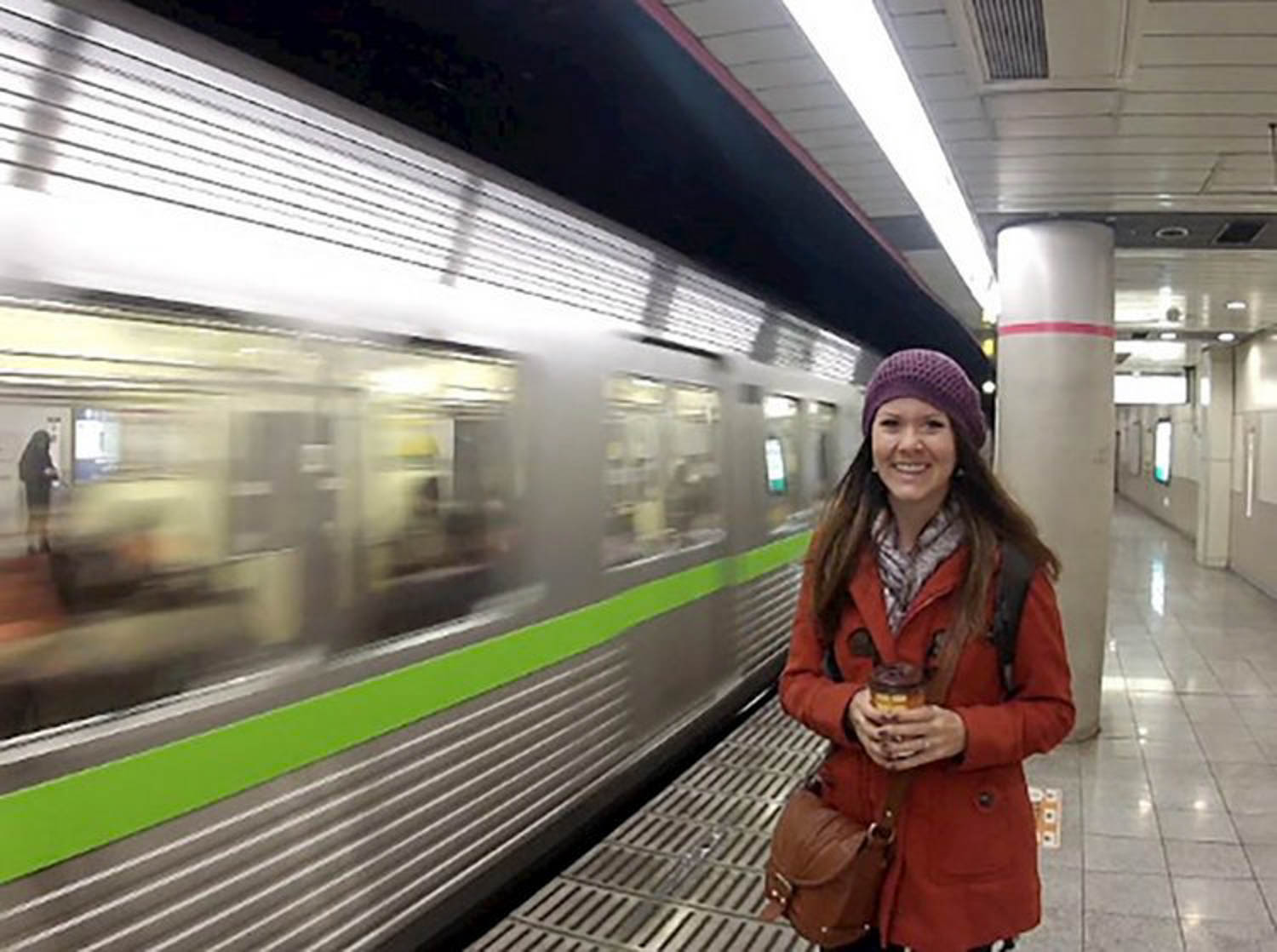
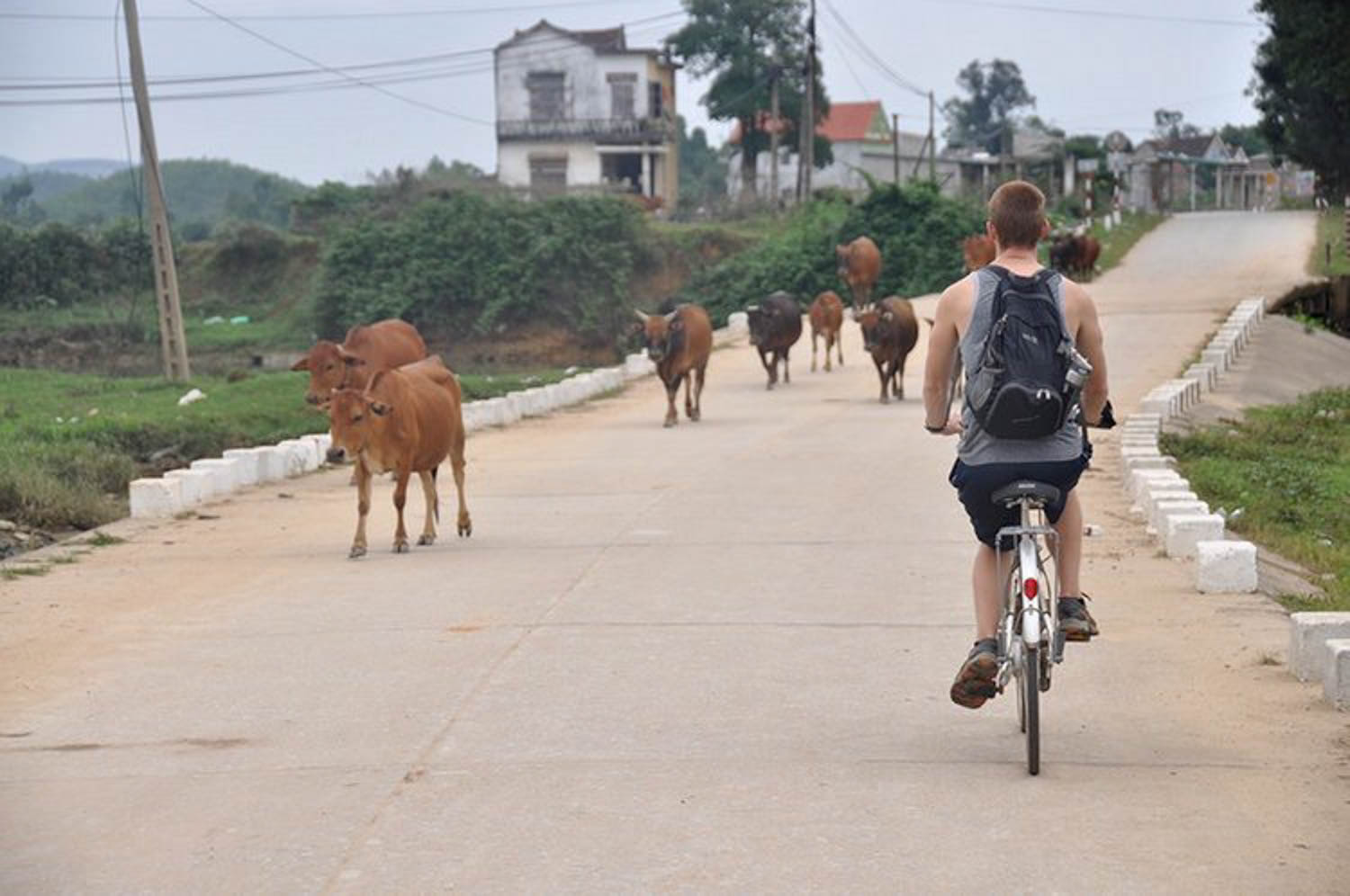
If you’re planning a trip overseas, you’ll likely be flying. And it’s true: flying is not good for the environment.
I spoke with one woman who said people should stop traveling abroad if they want to be conscious of the environment. While I understand where she’s coming from, international travel is an industry that is only growing. Plus, I think international can be such a wonderful opportunity to learn about the world and to interact with people from different backgrounds.
So yeah, if you’re flying you won’t be doing the environment any favors. But once you land, you can be more conscious of the type of transportation you use.
In many places around the world, it’s possible to take buses, trains and metros. If you plan ahead, it’s easy to work these types of public transportation into your trip. The best part is that many locals use public transportation, so you’ll have a more authentic experience and the opportunity to interact with people you meet along the way.
Bonus: Walk and bike when possible too! This is often the best way to really see a place, plus it’s good for the environment, your wallet, and your health too!
13. Be mindful about food waste

Here’s an interesting tidbit I learned recently: Food preparation is the number one contributor to water waste in hotels.
So next time you have a buffet at your hotel, be mindful of how much you’re putting on your plate. We’ve all been guilty of letting our eyes speak for our stomachs, and piling that food up! But when you can’t finish it, that food (and water used in preparation) goes to waste. Take smaller portions at a time and go up for seconds (or thirds!) if you’re still hungry.
Not only will you be wasting less food and water, but your waistline will thank you!
AFTER Your Trip
Even though your vacation has ended, there are still ways you can be a responsible tourist from home.
14. Sharing is caring
Did you see animals being treated poorly at a so-called “sanctuary”?
Did you stay at an “eco-hotel” where the only green thing about it was the color of the logo?
Even with all the planning in the world, it’s possible that you end up patronizing a company that isn’t operating ethically.
The only way these types of practices will stop is if we point them out, respectfully, of course. I’m not advocating “trolling” or filling the Internet with bad reviews. And I always believe it’s best to address issues in person before typing your gripes onto the computer screen.
But don’t be shy to share what you observe with other potential consumers so they can make an informed decision. Share the good, the bad and the ugly.
And just as important as it is to point out bad practices, I could argue that it’s even more important to shout out companies that are doing good things. A thoughtfully-written positive review can be huge for a small business. It can also show competitors that doing things the right way is important. YOU can start a positive chain reaction just by sharing your thoughts. So why wait?!
15. Offset your footprint if possible
If you’re able, consider offsetting your carbon footprint. You can calculate your carbon emissions and donate an equivalent amount of money to an organization that is bettering the environment.
We know this isn’t something everyone can do for every trip, but looking into it can give you a glimpse into how much of an impact your travels are actually making on the environment.
More on Responsible Travel
Yes, traveling responsibly requires more research and planning, but our world and its people are worth it. Don’t you agree?
For more resources, check out our page on Responsible Tourism for all of our related articles.
Save this article on Pinterest for later!
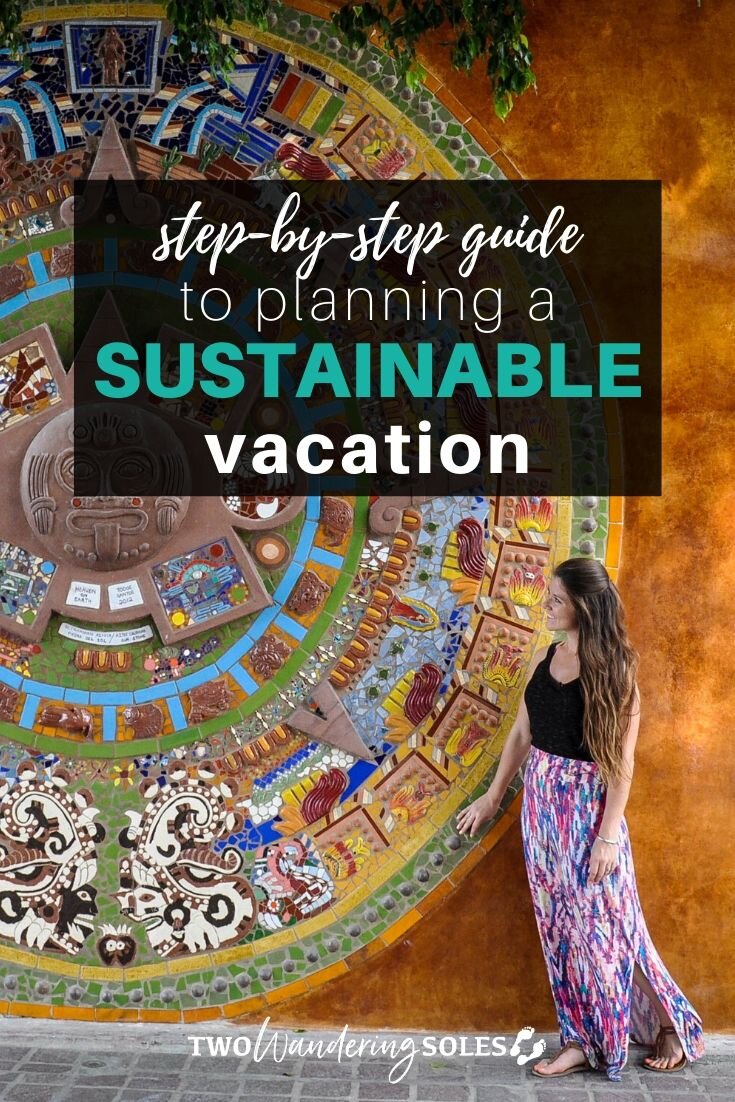
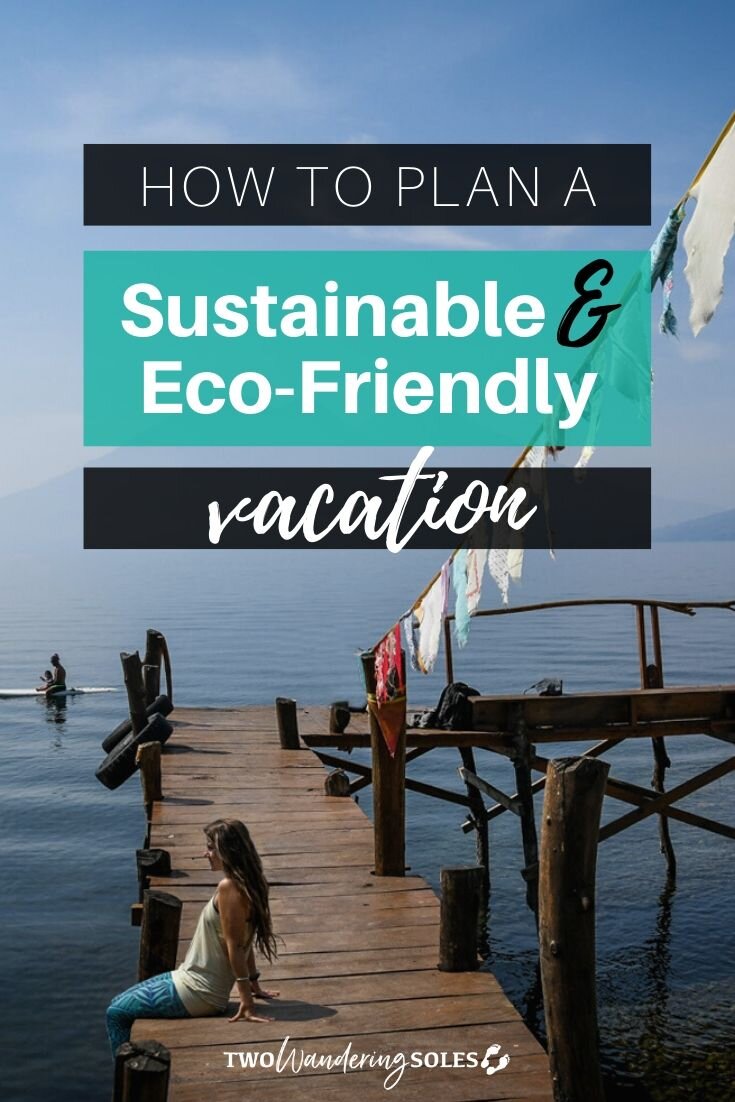
We want to hear from you!
When planning a vacation, is sustainability a priority to you? How have you traveled sustainably? We’d love to hear from you in the comments below!

Katie Diederichs is the lead writer and co-founder of Two Wandering Soles, where she creates in-depth travel guides, itineraries, and tips designed to help readers plan better trips with confidence. With a background in journalism, photography, and design, she combines thorough research with firsthand experience to deliver clear, practical, and visually driven travel content. As the primary trip planner, Katie turns complex logistics into easy-to-follow advice travelers can actually use.

Great article. I just wanted to point out a few things.
I have followed a course on sustainable tourism and they were very clear about the terrible effects of flying. We need to bear in mind we shouldn’t emit over a certain amount of Greenhouse gas emissions a year (3 tons for all of our activities including travel, and to give you an idea, that’s what we emit for one single flight from Europe to Australia..). So checking we ensure that is extremely important.
Otherwise whatever efforts we do in the destination are in vain…
Try to fly less often, maybe internationally once a year or every two years but stay much longer. Offset is not enough. Many projects to plant trees for instance don’t work. Especially for monocultures. Many big projects died and didn’t help the environment in the long run. So choose wisely! And don’t think because you offset you can travel more.
Still, I agree it’s important to keep travelling abroad for all the reasons you gave but also to help poor communities where tourism might be one of the only ways out… Like in many countries in Africa where relying solely on regional tourism wouldn’t be enough for the locals to make enough money.
thanks for the blog loved reading it helped me a lot
Hi guys. I’m currently researching sustainable tourism development, for my dissertation project for university in the U.K. Sustainable tourism development is a very important topic at the moment! I would greatly appreciate your help so if you can spare 5 mins to fill in the survey please do! The survey coconsists of 12 questions and its design makes it easy to use and complete.
Regards
Chris
https://docs.google.com/forms/d/e/1FAIpQLScqt4fl7N1NJF25mSjFO9_ycCU7o_ZKm-OJFs30liOPwtzHow/viewform?usp=sf_link
Hi Chris, thanks for your comment. If you want to talk further about your survey, please fill out the form on our Contact Us page. Cheers!
Your tips on Responsible Tourism have already helped me on a day to day life, plus to implement it on my travels, it is a big bonus for both, my conscience, and the place I am traveling to. These additional tips on Sustainable Tourism is an added bonus. I can’t imagine the impact it will have if most of the travelers follow Sustainable Tourism. I have shared your Responsible Tourism Tips blog with my travel friends and the response was just amazing.
Good job guys, keep spreading awareness and happiness. You guys truly are an inspiration. Lots of Love. Keep up the good work.
Aww, thank you Amey! This message just made our day and put huge smiles on our faces. It would be wonderful if everyone traveled sustainably. Keep spreading the good word and thanks for sharing!
Loved the post! Everything you talked about is how we love to travel. By doing some research you can enrich your travelling experience so much. Being braves and asking the right questions educates not only yourself but those you share you travel stories with. I can’t count the number of times I spoke about why elephant riding is wrong to the many people we met while backpacking. Sometimes all it takes is a conversation over a bowl of noodles to educate someone. Being respectful of the country and people you are visiting is so important…..remembering it is okay to ask what is appropriate. We just came back from a month holiday where the accommodations offered daily housekeeping. There was no reason to change the garbage everyday or the need for new towels each day…..we don’t do that at home, why do it somewhere else? I will be using your post as a guide and sharing it with our group of volunteers as we head to Nicaragua. Thank you for your important words.
Thanks Sande for your sweet comment. Glad to hear you have a sustainable mindset already before you are starting your travels. Keep sharing the word and creating good positive change.
Great post! We do many of the things you wrote about above, and also pay close attention to how much trash we’re creating while on the road. When we travel locally in the US we pack a cooler with food in reusable containers, veggies from our garden and the farmers market, and at least two metal water bottles each. In other countries, we try to choose the option that doesn’t create waste- ice cream in a cone, not a cup, smoothie in a glass in a cafe, not a plastic takeaway cup, street food at a place that uses dishes, not in styrofoam containers. Sometimes this means paying a little more, but we feel better about our choice when we’re conscious of this. Overall, we try to travel lightly and consciously, just like we live at home in the US. Thanks for your important message!
That’s amazing Megan! Thanks for sharing all those tips. You’re right; sometimes it costs a little more or requires a little more thought and planning (& in some countries it’s easier to make good choices than in others!), but if we all try to make a difference in small ways (like you’re doing!) it will add up! So happy to connect!
Wow this is an interesting read… thanks Katie you are awesome!
Thanks Armando! We’re glad you liked it!